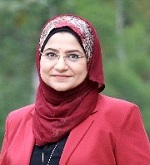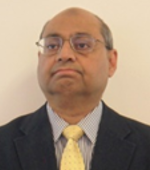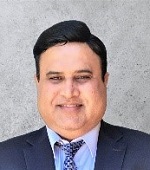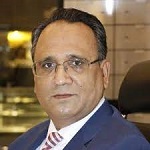

Symposium on Role of Emerging Technologies and Skills in Higher Education
Co-organizers/Speakers:
Prof Dr. Robina FarooqVC GCWU Faisalabad
Prof Dr. M. Asghar Hashmi,
Controller Exams, National Skills University, Islamabad
Prof Dr Zill-i-Huma Nazli,
Chairperson Dept. of Chemistry GCWUF Faisalabad
Prof. Dr. M. Yasin Akhtar Raja,
Phys and Optical Science & Engineering, UNC Charlotte, NC, USA
Summary:
Recent COVID-19 pandemic, sever threat of global warming and unfortunate international conflicts have challenged all industrial and life sectors across the globe, and the higher education is no exception. The educational systems around the world are prone and being severely impacted by the uncertainties casting shadows on the future of education. This scenario has prompted the educational institutions and the stakeholders to leverage unconventional and alternative modes of education delivery. That relies on and is based on the available information and communication technologies (ICTs). This has resulted in various constructive and positive changes in the educational landscape. But also, has raised concerns on ensuring quality of remote education provided, existence of scrawny educational infrastructure, and inequality in accessing the internet and compatible resources.There is no doubt that educational sectors are undergoing unprecedented difficulties and challenges during the pandemic era and global conflicts and warming adverse impacts. However, the current crisis can be turned into an opportunity by upgrading and building a more robust and resilient education system. In order to collectively envision the transformation, this session has been arranged, where its theme is consistent with the vision’s contemporary efforts at global level.
During the pandemics (i.e., Covid-19), natural disasters, e.g., floods in Pakistan and various unforeseen conditions in various regions of the globe, the roles of digital technologies are multilevel and profound. In those conditions, the institutions, public service- and healthcare-providers all have to rely on the high-speed and high-reliability connectivity enabled by global communications networks and information service providers both in public- and private-sectors.
While the high-fidelity and high-speed network services are the backbone, but without the compatible contents-development, management and suitable delivery, the entire-system would not function to accomplish the goals and objectives. Therefore, it comes to mutual support and cooperation among the institutions of higher learning & training and the colleges and schools at all levels. This could partly be accomplished with the state-supported resources but the real-success also hinges on the participation of private-sector, philanthropist non-governmental contributors and doers.
For such services and developments, sharing and adoption, a dedicated- and committed task-force is needed to connect, service and maintain the standards and credibility. Using the Symposium Platform, the participants having wide-ranging experiences will share their expertise and wisdom to propose and develop recommendations for the transformation of academic knowledge into viable products, services and production processes for continuity and sustainability.
Major Objectives:
While various Community level and Nationwide volunteer services, such as “University plus Project” [1] and others have acquired momentum but national-level organized efforts are required. There is thus a dire need to create awareness / incentivize the young folks to step forward the Skill Education rather than just conventional degree-programs. The new paradigm has a potential for paving a way towards self-sufficiency, reliance, and employability. And further, in turn it can fetch entrepreneurship rather than to be vagrant here and there with degree and no-job in hand. The foremost aims are the mitigation of the gaps between the formal education and the workplace/ job-market needs by developing the ‘Skills’ and imparting refined training to the students and trainees. There are good examples at grass-root levels, such as University Plus [1], IdeaGist [2] and IT Butler e-Services [3] projects.• To ensure educational continuity and proposed strategies to reshape, evolve, and transform the higher education after the pandemics, global natural and man-made disasters and conflicts.
• To fill the existing gaps between the quality, access and the prevailing university education paradigms.
• Universities’ efforts in creating, adapting and harmonizing curricula for remote learning and skills development.
• Focusing on training of the technical and support staff at the institutions in order to maintain access and work-quality in the university education delivery and assessment methods.
• Preparing the University graduates for National- and International job markets with fitting skillsets.
• Initiative and strategic reforms for making educational systems more robust and resilient to crises.
• Capitalizing on the role of technology such as ICT, Cyber-security, ML and AI to undertake new measures for benchmarking the quality of education and tackling the current digital divide. Eventually, sharing the experiences with the secondary to primary education systems as trickle down approach.
• Develop frameworks for coordination and cooperation to initiate effective and operative partnerships between public and private institutions.
Workshops/Presentation Session (2.5 - 3 hours)
Paper Submission:
Papers that present original work, validated by experimentation, simulation, or analysis, testbeds, field-trials, or real deployments are welcome for the Education Forum and the iiScience Conference’s Thematic area. All papers should be submitted via EDAS to the main iiScience conference by visiting this linkRegistration:
Visit iiScience registration at Register.Speakers:

Dr. Ayesha Sadaf
Assoc. Professor of Learning, Design & Technology,
Department of Educational Leadership, UNC Charlotte, USA
Title: Transforming Digital Learning in Higher Education

Dr. Ahmed S. Khan
Fulbright Specialist Scholar,
World Learning Inc.,
U.S. Dept. of State’s Bureau of Educational & Cultural Affairs (ECA)
Title: “Emerging Technologies and Challenges for Effective Teaching and Learning”

Dr. M. Khizar Bhutta
Sr. Engineering Manager, Whirlpool Corporation
Title: What If We All Could be Innovative!

Dr. Muhammad Manshad Satti
CEO IT Butler, Smart Solutions & EduServ
Title: The paradigm shifts in Teaching and Learning, While Adopting & implementing Rubrics based AI and ML Technologies for Online Education





 conference program
conference program
